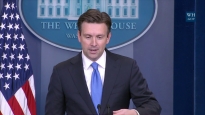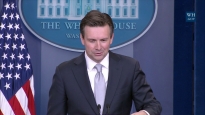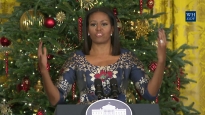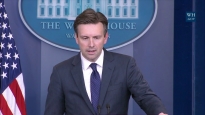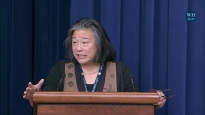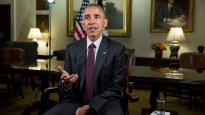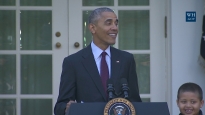President Obama Speaks on Investing in Infrastructure
February 26, 2014 | 20:16 | Public Domain
President Obama outlines his vision for investing in America’s infrastructure and announces a $600 million competition to help restore our infrastructure and put more Americans back to work repairing and modernizing our roads, bridges, railways, and transit systems.
Remarks by the President on Jobs in American Infrastructure
Union Depot
St. Paul, Minnesota
2:40 P.M. CST
THE PRESIDENT: Hello, St. Paul! (Applause.) It is good to be back in Minnesota. (Applause.)
AUDIENCE MEMBER: We love you!
THE PRESIDENT: I love you back. That’s why I came here. Good to see you.
Although, can I just say that when we got off the plane, Secretary Foxx, who is from North Carolina, turned to me and he said, this is the coldest I’ve ever been in my life. (Laughter.) Now, we were only out there for like a minute -- (laughter) -- which goes to show how soft these folks from North Carolina are when it comes to the weather. (Laughter and applause). I, on the other hand, am from Chicago -- (applause) -- I walked off those stairs and I was like, this is balmy, this is great. (Laughter.) February, in Minnesota -- can't beat it. Cannot beat it.
Now, in addition to Secretary Foxx, who I want to -- give him a big round of applause for that introduction. (Applause.) You’ve two champions for the people of Minnesota who are here today. You’ve got Representative Betty McCollum -- (applause) -- and Representative Keith Ellison. (Applause.) You’ve got your Mayor, Chris Coleman, in the house. (Applause.) The new Mayor of Minneapolis, Betsy Hodges, is here. (Applause.) And my great friend, who actually told me I was running for President before I knew I was running for President -- R.T. Rybak. Love that name. (Applause.) Where’s R.T.?
Now, I want to thank everybody who showed me around Union Depot and gave me a preview of this new light rail line. It is fantastic. (Applause.) And I also just want to say -- even though he’s not here today -- I want to say to everybody how Michelle and I have been keeping in our thoughts and prayers one of the great Americans that we know, as well as a great Minnesotan -- Walter Mondale. (Applause.)
Now, like millions of Americans, I’ve spent some time with Minnesotans lately -- because I was watching the Olympics. (Laughter.) Minnesota sent 19 athletes to the games. (Applause.) That’s tied for second most of any state, and they did us all proud. It is not shocking that Minnesotans might be pretty good at the Winter Olympics. (Laughter.) What is particularly interesting is that, once again, the tiny town of Warroad proved that it really is Hockeytown, USA, thanks to T.J. Oshie and Gigi Marvin, who we’re just so proud of. And T.J.’s shootout performance against the Russians I might say I enjoyed a lot. (Applause.) I tweeted at him about it.
So we’ve spent some time over the last few weeks on hockey, but I’m not here to talk about hockey. By the way, I cannot play hockey. (Laughter.) I grew up in Hawaii -- we do not have hockey in Hawaii. But I’m here to talk about what you’re doing in the Twin Cities, and how you’re helping to create new jobs and new opportunities for every American.
We are at a moment when our economy is growing. Our businesses have created about 8.5 million new jobs in the past four years. Unemployment is at the lowest it’s been in over five years; in Minnesota, it’s lower than it’s been in six and a half years. (Applause.) And, by the way, you’ve got a great governor who I served with in the Senate, Mark Dayton, who is helping to make that happen. (Applause.)
So in a lot of ways things are looking up. But in some ways, the trends that had been battering middle-class families for a long time have gotten even starker, because those at the top are doing better than ever, while wages and incomes for a lot of families have barely budged. And too many families are working harder than ever just to keep up. So as I said at the State of the Union address a few weeks back, our job is to reverse those trends. (Applause.) We’ve got to build an economy that works for everybody. We’ve got to restore opportunity for all people, so that no matter who you are, where you come from, what you look like, you can get ahead if you work hard and you’re responsible.
And so I laid out an opportunity agenda that has four parts. Number one, good jobs that pay good wages in manufacturing, in energy, in innovation and infrastructure. Number two, train folks with the skills they need to get those good jobs, something that your senator, Al Franken, is doing great work on every single day. He cares a lot about that job training issue. (Applause.) Number three, guaranteeing every child has access to a world-class education. (Applause.) And, number four, making sure that hard work is rewarded with wages you can live on, and savings you can retire on, and health care you can count on. That’s what we’re fighting for. (Applause.)
Minnesota is helping to lead the way on these issues. Your state legislature is poised to raise your minimum wage this year. (Applause.) In my State of the Union address, I called for a new women’s economic agenda. It’s actually a family economic agenda -- equal pay for equal work, paid sick leave and more. And there are leaders in your state legislature that are working hard at this, because they know when women succeed, America succeeds. (Applause.)
So on all these issues, we’re reaching out to members of Congress, looking to see if they’re willing to work with us on some of these priorities. But what I also said at the State of the Union is, in this year of action, whenever I can partner directly with states or cities or business leaders or civic leaders to act on this opportunity agenda, I’m going to go ahead and do it. We can’t wait. We’ve got to move. We’ve got to get things going. Too many families are counting on it. (Applause.)
So yesterday, I launched new hubs to attract 21st century manufacturing jobs to America. And today, I’m here to launch a new competition for 21st century infrastructure and the jobs that come with it, because any opportunity agenda begins with creating more good jobs. And one of the fastest and best ways to create good jobs is by rebuilding America’s infrastructure -- our roads, our bridges, our rails, our ports, our airports, our schools, our power grids. We’ve got a lot of work to do out there, and we’ve got to put folks to work. (Applause.)
One of the most difficult things about the financial crisis we went through was the housing bubble bursting, and construction workers were hammered harder than just about anybody. And while we’ve cut the unemployment rate for construction workers almost in half since 2010, too many are still looking for jobs at a time when we've got so much that we could put them to work on rebuilding. We’ve got ports that aren’t ready for the next generation of supertankers. We’ve got more than 100,000 bridges that are old enough to qualify for Medicare. (Laughter.)
Everybody knows, and nobody knows better than Minnesotans, when we've gone through a winter like this, roads are wrecked, full of potholes all across the country. (Applause.)
Now, other countries are not waiting to rebuild their infrastructure. They’re trying to out-build us today so they can out-compete us tomorrow. As a percentage of GDP, countries like China, Germany, they’re spending about twice what we're spending in order to build infrastructure -- because they know that if they have the fastest trains on the planet or the highest-rated airports or the busiest, most efficient ports that businesses will go there.
But we don't want businesses to go there. We want them to come here to Minnesota. (Applause.) We want them to come here to the United States of America. And that means the best airports and the best roads and the best trains should be right here in America.
At a time when companies are saying they intend to hire more people this year, we need to make that decision easier for them. And we can create jobs at the same time, rebuilding our transportation systems, our power grids, our communications networks -- all the things that commerce relies on and that help get workers to those jobs.
So the bottom line is there’s work to be done, workers ready to do it. Rebuilding our infrastructure is vital to business. It creates good-paying jobs that, by the way, cannot be outsourced. (Applause.) This is one of Congress’s major responsibilities -- helping states and cities fund new infrastructure projects. (Applause.)
And part of the reason I'm focused on this is Congress has an important deadline coming up. If Congress doesn’t finish a transportation bill by the end of the summer, we could see construction projects stop in their tracks, machines sitting idle, workers off the job.
So next week, I'm going to send Congress a budget that funds rebuilding our transportation infrastructure in a more responsible way -- by doing it over four years, which gives cities and states and private investors the certainty they need to plan major projects. Projects like repairing essential highways and bridges; building new transit systems in fast-growing cities and communities, so folks who live there can get to work and school every day and spend less time sitting in traffic. (Applause.) And we're going to have to construct smarter, more resilient transportation systems that can withstand the worst impacts of climate change, like bigger surges of water that we’ve seen in recent floods.
So, all told, my transportation budget will support millions of jobs nationwide. And we’ll pay for these investments in part by simplifying the tax code. We’re going to close wasteful tax loopholes, lower tax rates for businesses that create jobs here at home, stop rewarding companies for sending jobs to other countries, use the money we save in this transition to create good jobs with good wages rebuilding America. It makes sense. (Applause.)
Now, I’ll be honest with you, there are leaders in both parties who are willing to reach across the aisle in Congress when it comes to American infrastructure. They know how important it is. And infrastructure didn’t use to be a partisan issue -- shouldn’t be Democrat or Republican. Everybody uses roads, everybody uses ports, airports. Unfortunately, time and again over the past few years, there have been some Republicans in Congress who refused to act on common-sense proposals that will create jobs and grow our economy. It’s not that they’re -- I guess they don’t like roads; they just don’t want to pay for them. It doesn’t work that way. You’ve got to come up with a way to get these projects going.
So while Congress is deciding what it’s going to do next, I’m just going to go ahead and do what I can to create more good jobs. And that’s why I came here to St. Paul. (Applause.)
Because this project symbolizes what’s possible. Union Depot was renovated and expanded with the help of what we call TIGER grants. These are competitive grants that we created as part of the Recovery Act, also known as the stimulus, which actually worked despite what everybody claims. (Applause.) So the idea is, if a city or state comes up with a plan to modernize transportation infrastructure that will have a significant impact on economic activity, and if they line up other sources of funding to help pay for it, they can win a TIGER grant and the federal government becomes a partner with these local communities.
So far, these grants have given a boost to 270 infrastructure projects across all 50 states. (Applause.) And you heard Secretary Foxx talk about -- these grants are helping cities like LA and states like North Carolina, and they helped you rebuild this depot into a hub that will bring different modes of transportation together under one roof instead of scattered across the city. Amtrak is going to be here. The new Metro Green Line will be here. Bus lines will be here. (Applause.)
And I just had a chance to take a look at some of those spiffy new trains. (Laughter.) They are nice. And they’re energy efficient. They’re going to be reliable. You can get from one downtown to the other in a little over 30 minutes instead of when it’s snowing being in traffic for two hours. (Applause.) The trains were made in California, which meant folks were put to work here in the United States building them. (Applause.)
And here’s the best part of it: Not only have you made a more efficient transportation system, cutting down commutes, saving on gas, reducing carbon pollution, but this depot has helped to boost economic development in Lowertown St. Paul. (Applause.) Just across the street the old downtown post office building is becoming apartments and shops. All told, more than 4,000 jobs were created for this project. (Applause.) And we’re seeing businesses crop up and new development crop up all along the line.
So everybody is winning. And in part because of some flexibility that we showed during the planning process, the line is also going to stop in some poor neighborhoods that oftentimes have difficulty getting to the places where there are jobs. (Applause.) So it’s going to help folks who are willing to work hard, trying to get into the middle class, it helps them get access -- helps people get access to opportunity that, up until this point, had a tough time.
So we know this works. Today, we’re kicking off the next round of competition for TIGER grants. Mayors and governors, city councils, state legislatures, all of you who are watching here today, if you’ve got a great idea for your city or your state, then let us know your plan. If it will encourage economic activity and support local businesses, and help put people to work, then your country is interested in partnering with you.
And TIGER grants aren’t the only way that we can help cities like St. Paul and Minneapolis rebuild their infrastructure. You’ve got -- federal funding helped to build the Green Line; that's going to make it easier than ever to travel between the two cities. You’ve got more than 5,000 construction workers from all over Minnesota helping to build it. Nearly 200 police officers, train operators and maintenance workers are being hired. And that’s not counting all the jobs that are being created from the offices and the apartment buildings that are going to be built along the line. Because the trains stopped at neighborhoods that have access to public transportation, those folks are going to work. And all of this can be duplicated all across the country.
But unfortunately, funding for these projects are going to be in jeopardy unless Congress passes this new transportation bill. So I want everybody to understand. Now, the good news is Keith Ellison, Betty, they're already onboard. (Applause.) They know this needs to happen. Al Franken, all over it. Some Democrats and Republicans are already working together to make sure transportation doesn't -- funding doesn’t run out. And we’re seeing some glimmers of hope, because this new round of TIGER grants was the result of bipartisan cooperation. That’s what needs to happen when we work together.
But we’re going to need your voices telling a story around the country about why this is so important. Roads and bridges should not be a partisan issue. More Americans should have access to the kind of efficient, affordable transit you’re going to have with the Green Line. (Applause.) There’s no faster way or better way for Congress to create jobs right now and to grow our economy right now, and have a positive impact on our economy for decades than if we start more projects and finish more projects like this one.
Let’s create more good jobs, build smarter schools, better airports, faster railways, better broadband networks. Let’s educate our kids and our workers better. Let’s rebuild an economy where everybody who is willing to hard has a chance to get ahead. (Applause.)
This is the beginning, not the end. We’ve got a lot more rail we got to lay. We’ve got a lot more roads we got to travel. Let’s get going, Minnesota.
Thank you. God bless you. God bless the United States of America. (Applause.)
END
3:00 P.M. CST
|
November 30, 2016
|
November 29, 2016
|
November 29, 2016
|
November 28, 2016
|
|
November 28, 2016
|
November 25, 2016
|
November 24, 2016
|
November 23, 2016
|
- &lsaquo previous
- …
- 5
- 6
- 7
- 8
- 9
- 10
- 11
- 12
- 13
- …
- next &rsaquo
